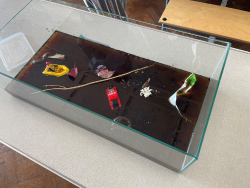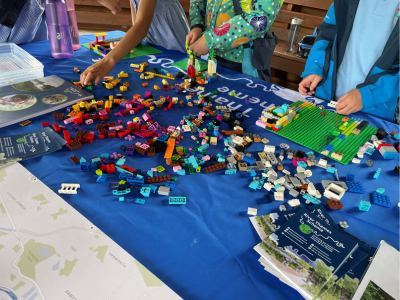River Thames Scheme talks sustainability and the environment with school students
Representatives from the River Thames Scheme (RTS) and the Environment Agency (EA) visited Laleham Church of England Primary School earlier in the summer to lead an interactive, awareness-building assembly session about sustainability and the importance of local environmental initiatives.
The visit follows the installation of sustainable drainage planters at the school, funded by the Department of Education (DofE) under the Sustainable Drainage System (SuDS) initiative as part of the RTS. The installed planters are designed to capture and store rainwater during heavy storms. This slows the flow of rainwater from the school roof entering the normal drainage system helping prevent overload of the wider drainage network.
In addition to their practical functions, the planters also serve as valuable educational tools for school children, showing them how water flows are managed, stored, and even restored for growing plants. This initiative, in partnership with the DofE, aims to reduce surface water risk, promote sustainability, and enhance climate change awareness among students.
During the assembly, the children learned about the increasing risk of flooding from climate change and how local schemes such as the RTS can help reduce that risk for homes, businesses and communities.
 The highlight of the session was the "Flood Tank" exercise, a hands-on activity designed to demonstrate the dangers and impacts of floodwater. The students also explored the wide-ranging benefits of the RTS, including the provision of green spaces, active travel routes, recreational facilities and wildlife habitats. The event also highlighted how green infrastructure can boost biodiversity and create healthier, more vibrant community spaces.
The highlight of the session was the "Flood Tank" exercise, a hands-on activity designed to demonstrate the dangers and impacts of floodwater. The students also explored the wide-ranging benefits of the RTS, including the provision of green spaces, active travel routes, recreational facilities and wildlife habitats. The event also highlighted how green infrastructure can boost biodiversity and create healthier, more vibrant community spaces.
Mrs Helen Dymott, Curriculum Lead at Laleham Church of England Primary School, said: "It was great to have representatives from the Environment Agency and the River Thames Scheme visit our school. The students enjoyed finding out more about the long term environmental benefits of the RTS, and we're looking forward to continued collaboration and more educational opportunities."
Eddie Rrokaj, Project Director of the RTS, added: "The RTS will benefit future generations. Engaging with schools is a key part of our mission to inform and involve local young people in our efforts. We are delighted to be able to share plans with the students and the wider community through initiatives such as this."
Following the assembly, the RTS team hosted a pop-up activity during pick-up time at the school, where they discussed the scheme and related issues with parents.
Together, the activities provided a valuable opportunity for the scheme to share ideas and information with members of the local community and may serve as a model for similar events at other local schools.

